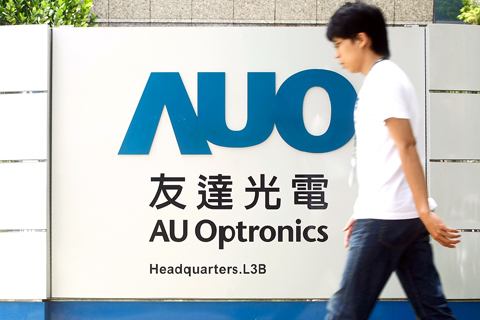AU Optronics Corp (友達光電), the world’s third-largest liquid-crystal-display (LCD) panel maker, yesterday said it planned to quadruple output at its 8.5-generation (8.5G) fab before the end of the year to meet a rapid across-the-board rise in demand.
The announcement follows the company’s comment two weeks ago that it did not see any “unfavorable factors” to the LCD industry in the second half of the year, helped by the seasonal computer shopping spree in the third quarter and Chinese buying ahead of the Lunar New Year in the fourth quarter.
AU Optronics said it would be able to supply only 80 percent of customer demand this quarter, which could drive up average selling prices by between 5 percent and 10 percent in the July-to-September period.

PHOTO: CHRIS TZOU, BLOOMBERG
To alleviate the shortage, AU Optronics chief executive Chen Lai-juh (陳來助) said the company “hopes to increase output as soon as it can.”
Average equipment utilization is approaching full usage, Chen said.
On June 23, the company hiked its target capital spending for this year to NT$75 billion (US$2.3 billion), from its previous estimate of NT$60 billion.
The company plans to increase output at its advanced 8.5G fab to full capacity, or 40,000 sheets of glass substrates per month, by the end of the year, compared with 10,000 sheets now
The 8.5G fab in Taichung processes bigger glass substrates, which can be cut into six sheets of 52-inch panels for LCD TV, or eight sheets of 46-inch panels.
AU Optronics also raised its forecast of global LCD TV demand by 14 percent to 125 million units, from its previous estimate of 110 million units, because of faster replacement of bulky cathode-ray-tube TVs and older LCD TV models.
Demand comes primarily from emerging markets such as China, India and Iran, company chairman Lee Kun-yao (李焜耀) told reporters yesterday.
The company is also evaluating the possibility of building a panel production line in China to be closer to customers and save on a potential rise in tariffs on LCD display modules.
Taiwanese panel makers are only allowed to assemble LCD modules in China, but the Beijing government is reviewing a longstanding ban on manufacturing LCD panels to help Taiwanese firms fend off competition from South Korean rivals.
Shares of AU Optronics fell 0.82 percent to NT$36.50 yesterday, outpacing the benchmark TAIEX, which lost 1.43 percent.

DIVIDED VIEWS: Although the Fed agreed on holding rates steady, some officials see no rate cuts for this year, while 10 policymakers foresee two or more cuts There are a lot of unknowns about the outlook for the economy and interest rates, but US Federal Reserve Chair Jerome Powell signaled at least one thing seems certain: Higher prices are coming. Fed policymakers voted unanimously to hold interest rates steady at a range of 4.25 percent to 4.50 percent for a fourth straight meeting on Wednesday, as they await clarity on whether tariffs would leave a one-time or more lasting mark on inflation. Powell said it is still unclear how much of the bill would fall on the shoulders of consumers, but he expects to learn more about tariffs

NOT JUSTIFIED: The bank’s governor said there would only be a rate cut if inflation falls below 1.5% and economic conditions deteriorate, which have not been detected The central bank yesterday kept its key interest rates unchanged for a fifth consecutive quarter, aligning with market expectations, while slightly lowering its inflation outlook amid signs of cooling price pressures. The move came after the US Federal Reserve held rates steady overnight, despite pressure from US President Donald Trump to cut borrowing costs. Central bank board members unanimously voted to maintain the discount rate at 2 percent, the secured loan rate at 2.375 percent and the overnight lending rate at 4.25 percent. “We consider the policy decision appropriate, although it suggests tightening leaning after factoring in slackening inflation and stable GDP growth,”

Greek tourism student Katerina quit within a month of starting work at a five-star hotel in Halkidiki, one of the country’s top destinations, because she said conditions were so dire. Beyond the bad pay, the 22-year-old said that her working and living conditions were “miserable and unacceptable.” Millions holiday in Greece every year, but its vital tourism industry is finding it harder and harder to recruit Greeks to look after them. “I was asked to work in any department of the hotel where there was a need, from service to cleaning,” said Katerina, a tourism and marketing student, who would

i Gasoline and diesel prices at fuel stations are this week to rise NT$0.1 per liter, as tensions in the Middle East pushed crude oil prices higher last week, CPC Corp, Taiwan (台灣中油) and Formosa Petrochemical Corp (台塑石化) said yesterday. International crude oil prices last week rose for the third consecutive week due to an escalating conflict between Israel and Iran, as the market is concerned that the situation in the Middle East might affect crude oil supply, CPC and Formosa said in separate statements. Front-month Brent crude oil futures — the international oil benchmark — rose 3.75 percent to settle at US$77.01